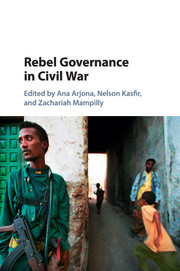Book contents
- Half title page
- Title page
- Copyright page
- Contents
- Contributors
- Book part
- 1 Introduction
- 2 Rebel Governance – Constructing a Field of Inquiry: Definitions, Scope, Patterns, Order, Causes
- 3 Del Gobierno de Abajo al Gobierno de Arriba …and Back: Transitions to and from Rebel Governance in Latin America, 1956–1990
- 4 Performing the Nation-State: Rebel Governance and Symbolic Processes1
- 5 Rebel Diplomacy: Theorizing Violent Non-State Actors’ Strategic Use of Talk
- 6 Rebel Governance During the Greek Civil War, 1942–1949
- 7 Comparing Rebel Rule Through Revolution and Naturalization: Ideologies of Governance in Naxalite and Naga India
- 8 Myths Set in Motion: The Moral Economy of Mai Mai Governance
- 9 Civilian Resistance to Rebel Governance1
- 10 Dialogue Direct:Rebel Governance and Civil Order in Northern Côte d’Ivoire
- 11 The Rebel State in Society: Governance and Accommodation in Aceh, Indonesia1
- 12 Organization and Governance: The Evolution of Urban Militias in Medellín, Colombia
- 13 Predatory Rebellions and Governance: The National Patriotic Front of Liberia, 1989–1992
- 14 Conclusion
- Index
- References
11 - The Rebel State in Society: Governance and Accommodation in Aceh, Indonesia1
Published online by Cambridge University Press: 05 October 2015
- Half title page
- Title page
- Copyright page
- Contents
- Contributors
- Book part
- 1 Introduction
- 2 Rebel Governance – Constructing a Field of Inquiry: Definitions, Scope, Patterns, Order, Causes
- 3 Del Gobierno de Abajo al Gobierno de Arriba …and Back: Transitions to and from Rebel Governance in Latin America, 1956–1990
- 4 Performing the Nation-State: Rebel Governance and Symbolic Processes1
- 5 Rebel Diplomacy: Theorizing Violent Non-State Actors’ Strategic Use of Talk
- 6 Rebel Governance During the Greek Civil War, 1942–1949
- 7 Comparing Rebel Rule Through Revolution and Naturalization: Ideologies of Governance in Naxalite and Naga India
- 8 Myths Set in Motion: The Moral Economy of Mai Mai Governance
- 9 Civilian Resistance to Rebel Governance1
- 10 Dialogue Direct:Rebel Governance and Civil Order in Northern Côte d’Ivoire
- 11 The Rebel State in Society: Governance and Accommodation in Aceh, Indonesia1
- 12 Organization and Governance: The Evolution of Urban Militias in Medellín, Colombia
- 13 Predatory Rebellions and Governance: The National Patriotic Front of Liberia, 1989–1992
- 14 Conclusion
- Index
- References
Summary
Rebel organizations cannot be understood solely in terms of their coercive capacities. Many seek to displace the state and usurp its functions. How do rebel groups establish systems of governance? Applying Migdal’s state in society approach, I show how rebel governance can evolve through alliances with societal forces. I do so by focusing on the evolution of the Free Aceh Movement (GAM) in Indonesia. GAM came to govern a handful of districts by allying with two groups – rural Islamic teachers (ulama) and urban student activists – whose goals and identities were in many ways at odds with its own. These rebel state/society alliances were mutually beneficial. Ulama and activists gained security and were able to pursue their agendas through GAM, which in turn gained wider support and the capacity to govern the local population. These alliances were also transformative, resulting in significant convergence in terms of the identities and goals of all parties.
- Type
- Chapter
- Information
- Rebel Governance in Civil War , pp. 226 - 245Publisher: Cambridge University PressPrint publication year: 2015
References
- 20
- Cited by



